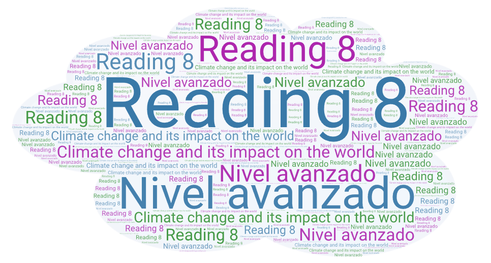Descripción: Este artículo en inglés aborda el cambio climático y su impacto global. Examina las tendencias actuales, destacando la creciente frecuencia de eventos climáticos extremos. También explora las consecuencias en los ecosistemas, la biodiversidad y la vida humana. Ofrece perspectivas sobre las medidas necesarias para mitigar este fenómeno y destaca la urgencia de la acción colectiva para abordar este desafío planetario

Climate Change and its Impact on the World
Climate change, driven largely by human activities, has emerged as one of the most pressing challenges of our time. The rise in global temperatures, melting ice caps, and extreme weather events are clear indicators of the Earth's changing climate. This article explores the multifaceted impact of climate change on the world, encompassing ecological, social, and economic dimensions.
Ecological Consequences:
The natural world is experiencing unprecedented disruptions due to climate change. Polar ice is melting at an alarming rate, leading to rising sea levels that threaten coastal ecosystems. The acidification of oceans, a result of increased carbon dioxide absorption, poses a grave threat to marine life, particularly coral reefs. Furthermore, shifts in temperature and precipitation patterns are affecting biodiversity, causing habitat loss and threatening numerous species with extinction.
Social Ramifications:
Climate change is not merely an environmental issue; it is a profound social challenge. Vulnerable communities, often least responsible for greenhouse gas emissions, bear the brunt of its impacts. More frequent and severe heatwaves, storms, and droughts exacerbate food and water scarcity, disproportionately affecting marginalized populations. Mass migrations and conflicts over dwindling resources become heightened risks, amplifying existing social inequalities.
Economic Challenges:
The economic ramifications of climate change are extensive and complex. Extreme weather events wreak havoc on infrastructure, leading to substantial financial losses. Agriculture faces increased uncertainty as traditional growing seasons shift, affecting crop yields. Industries reliant on natural resources, such as fisheries and forestry, confront existential threats. The economic interconnectedness of nations implies that disruptions in one region can trigger ripple effects across the globe.
Global Cooperation and Mitigation Strategies:
Addressing climate change necessitates international collaboration. The Paris Agreement, a landmark accord, seeks to limit global warming to well below 2 degrees Celsius. However, achieving these goals requires collective and immediate action. Transitioning to renewable energy sources, implementing sustainable land-use practices, and promoting technological innovation are crucial components of any effective mitigation strategy.
Individual and Community Engagement:
While international agreements are crucial, individuals and local communities play a vital role in the fight against climate change. Sustainable lifestyle choices, energy conservation, and community-driven initiatives contribute to a broader culture of environmental responsibility. Education and awareness are key tools in fostering a global mindset that recognizes the interconnectedness of human activities and their impact on the planet.
In conclusion, climate change is a complex and interconnected issue that demands comprehensive solutions. Understanding its ecological, social, and economic ramifications is essential for devising effective strategies. By embracing sustainable practices, fostering global cooperation, and advocating for policy changes, we can work towards a more resilient and harmonious relationship between humanity and the environment.
